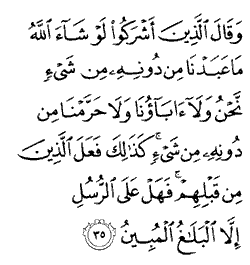Getting Rewarded, Lover of Humanity, Passions
Issue 767 » December 6, 2013 - Safar 3, 1435
Living The Quran
Getting Rewarded
An-Nahl (The Bee) Chapter 16: Verse 35
 "The worshippers of false gods say: ‘If Allah had so Willed, we should not have worshipped aught but Him, neither we nor our fathers, nor should we have prescribed prohibitions other than His.’ So did those who went before them. But are Messengers charged with aught but to preach the clear message?"
"The worshippers of false gods say: ‘If Allah had so Willed, we should not have worshipped aught but Him, neither we nor our fathers, nor should we have prescribed prohibitions other than His.’ So did those who went before them. But are Messengers charged with aught but to preach the clear message?"
It is false to argue that we should have been compelled to follow guidance, because Allah gave us the freedom to choose belief and righteousness and equipped us with everything necessary for this purpose in accordance with His Divine Will, so that out of our own free will we could choose and abide by truth and virtue and then get our reward.
This leads us to two important results:
1) If Allah had guided aright all men and prevented them from doing any wrong or committing any sin, which Allah could easily have done, this would have transformed human beings into angels and rendered all their human responsibilities and obligations meaningless since these require freedom of choice and action.
2) When people try to absolve themselves of their obligations on the pretext that they are helpless in the face of Divine Will, they in fact reject the blessing with which Allah has honoured them – the blessing of free will. This is nothing short of rejecting the pattern fixed for human nature by the higher Will of Allah. In such a case man could not rightfully hope for any reward for following and obeying Him. None of these false assertions is supported by any factual evidence in life. And both the Quran and the Hadith explicitly and conclusively reject and repudiate them.
Compiled From:
"Freedom and Responsibility in Quranic Perspective" - Hasan Al-Anani, pp. 138-139
Understanding The Prophet's Life
Lover of Humanity
The man destined to be the Messenger to all humanity and the leader of all humanity was endowed by Allah with a great love for all people, black or white, red or yellow – a love for people without discrimination. In his farewell sermon to the Muslim community, Muhammad, peace be upon him, declared: “All of you descend from Adam and Adam was made of earth. There is no superiority for an Arab over a non-Arab nor a non-Arab over an Arab; neither for a white person over a black person nor a black person over a white person except the superiority gained through God-consciousness (taqwa). Indeed the noblest among you is the one who is most deeply conscious of God.” This great love was indispensable for such a great task as his. Without this great love for humanity, he could not have led people upon the prolonged and patient path towards the great Truth, towards the liberation of mankind from the worship of false deities to the worship of Allah, the True Divinity.
As an insight on this point, recall a rare situation the Prophet faced. When he was abandoned in Makkah by his near relatives through hatred and enmity to his cause, when he was persecuted under the violation and the tyranny of Quraysh, what did he do? He said to his Lord, “O Allah! May you forgive my people, for they are ignorant, they do not know the Truth.”
Compiled From:
"Islam: The Way of Revival Vol 1" – The Way of The Prophet: Muhammad Qutb, pp. 129-130
Blindspot!
Passions
The monotheistic religions did not base their teachings on the sciences, and the psychologists and psychoanalysts of the late nineteenth century and the first half of the twentieth tried to formulate theories and establish methodologies on the basis of experiments they were able to analyse by examining the behaviour of their patients. And yet all these approaches make the same observations and strive to achieve a similar objective: no matter whether their message is based upon moral principles, the aspiration to inner freedom or even the desire to achieve a psychological equilibrium, the goal is always to achieve and maintain mastery and control over one’s emotions and passions. They are beyond our control, and the task of philosopher, initiate, believer or patient is to become aware of the indeterminate element within himself or herself and to understand, insofar as that is possible, how that element functions in an attempt to control it and thereby attain an inner harmony.
Our emotions are often beautiful, but they can also be dangerous. They represent our spontaneity and seem to speak to us of our freedom. And yet all contemporary studies – from neurology and psychology to marketing – prove that our emotions are the form of self-expression over which we have least control, that they are highly vulnerable and, basically, easily manipulated. Advertising, music, atmospheres, subliminal messages and films can have an impact on our emotional life, and we cannot control it because we are not even conscious of it. In effect, he who can know and master its functioning and psychology from outside can become twice its master.
Compiled From:
"The Quest for Meaning" - Tariq Ramadan, pp. 113-115